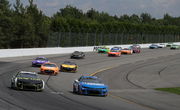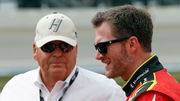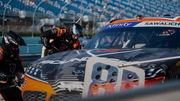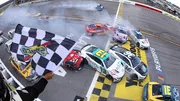
via Imago
Dale Earnhardt Sr | Image Credits: Imago

via Imago
Dale Earnhardt Sr | Image Credits: Imago
There was a time when NASCAR drivers spoke their minds, unfiltered and unafraid. If they were frustrated, they let the world know. If the racing product was terrible, they called it out. Legends like Dale Earnhardt Sr., Tony Stewart, and Kevin Harvick weren’t just competitors; they were the pulse of the garage, shaping the sport with their raw honesty.
Fast forward to today, and those fiery personalities have been replaced by carefully scripted soundbites, sponsor-friendly clichés, and an almost robotic approach to media. NASCAR’s biggest stars aren’t just driving cars—they’re walking PR firms, cautious not to ruffle feathers. But at what cost? Dale Earnhardt Sr. never sugarcoated anything. If he thought NASCAR was messing up, he’d say it—loud and clear.
ADVERTISEMENT
Article continues below this ad
NASCAR should take inspiration from Senior’s iconic rant
In 2000, after a frustrating Daytona 500, he delivered one of his most iconic rants: “That’s the worst race I’ve ever seen at Daytona in a long, long time. They took NASCAR West Cup racing and made it some of the toughest racing. They took racing away from the drivers’ and the crews’ hands. We can’t make adjustments and kick back our car and drive like we want. They just killed the race at Daytona. That’s all I have to say. Mr. Bill France Sr. would roll over in his grave if he’d seen that deal.”
Those words ring out today, but the face of NASCAR is much different now than it was during The Intimidator’s time. The tough-talking, no-holds-barred drivers who made stock car racing appointment viewing have been replaced by what many fans refer to as “PR robots.” Now, when a race is a debacle, you don’t hear the honesty of the sort that Earnhardt Sr. would have delivered. Instead, drivers trot out sponsorable platitudes, thanking their teams, their manufacturers, and their corporate backers, even when they’re seething with anger.
“They’ve just killed the racing at Daytona… Mr. Bill France Sr would probably roll over in his grave if he’d seen that deal.”
Angry at a new rules package, Dale Earnhardt had a classic rant over the style of racing at Daytona after the Twin 125s
On this date in 2000: pic.twitter.com/Bz7IoF0oMv
— nascarman (@nascarman_rr) February 17, 2025
It wasn’t always this way. In the ’90s and early 2000s, drivers weren’t afraid to call out NASCAR. Tony Stewart once famously yelled that the sport fabricated “debris cautions” just to rattle up races. Kevin Harvick would rant about safety issues or rules he perceived as absurd. Even Jeff Gordon, who was cleaner in the marketability sense, wasn’t afraid to vent about frustration. Now? It’s like walking on a landmine to criticize NASCAR. The second a driver says something even vaguely controversial, they’re either apologizing the next day or eerily silent. That’s why some fans have begun using the term “hush money”—an accusation that NASCAR quietly urges its drivers to walk the company line rather than speak their own minds.
It’s not that today’s drivers are opinion-less. It’s just that they’ve learned to keep their thoughts to themselves. With multimillion-dollar endorsements and manufacturer affiliations hanging in the balance, overstepping one’s bounds can cost opportunities, endorsement deals, or even a penalty from NASCAR itself. Naturally, NASCAR has always been a business, but it once had a rough-around-the-edges, rebellious charm. The personalities were uncut, the rivalries genuine, and the words uncensored.
Top Comment by
Staging belongs in Broadway shows! Racing is 500 miles, 3 sets of tires, three cans of gas and flat out. Until...more
Share your take
Now, post-race interviews sound scripted. When a crash eliminates half the field at Daytona, rather than saying it’s a “complete joke” like Earnhardt used to, drivers grumble about “learning experiences” and “being grateful for the chance.” It’s no surprise that old-time fans feel alienated. Dale Earnhardt Sr. was more than a driver; he was the voice of the garage. He did not mind stirring up feathers, because he was passionate about the sport. If he were alive today, reading drivers walk around answering every question gingerly, you can bet he’d have something to say.
Trending
ADVERTISEMENT
Article continues below this ad
Dale Earnhardt’s Lasting Legacy: A Family Tradition of Toughness and Excellence
The Earnhardt name is one with the very spirit of stock car racing. Three generations of Earnhardts have left their mark on NASCAR—from Dale Earnhardt Sr., whose 34 Daytona victories and seven Cup Series titles made him “The Intimidator,” to Dale Earnhardt Jr., whose consecutive Xfinity Series championships won him over fans. Now, Kelley Earnhardt, the daughter of the much-loved Jr., continues this legacy, set on keeping her family’s heritage alive both on and off the track.
In an emotional interview on SiriusXM NASCAR Radio, Kelley said, “To have my own kids sitting in here racing and the opportunity to continue building that legacy. I believe that most of all, we owe it to the sport’s fans to keep what my dad created during his era. That’s when the sport really took its wings and flew and expanded. There’s a responsibility on us to kind of keep that going and I hope my children are listening and they want to do the same thing when I’m too old to do this.” What she says reflects the deep personal commitment that characterizes the Earnhardt tradition—a commitment driven by passion, self-denial, and an unyielding pursuit of excellence.
The influence of Dale Earnhardt Sr. can still be felt in the racing world. As Kyle Petty once succinctly stated, “But once the sport really begins to take off and people are paying attention to it … you can’t afford to lose a Dale Earnhardt.”. You just can’t. That sobering reminder of loss drove sweeping safety reforms following the tragic death of The Intimidator in 2001, guaranteeing that his legacy would also be one of innovation and concern for future generations.
ADVERTISEMENT
Article continues below this ad
And now, as Kelley observes her daughter Karsyn and son Wyatt start charting their own courses in motorsports, the Earnhardt legacy endures—not only as a history of past triumphs, but as a guarantee of bravery, perseverance, and abiding love for the sport.
ADVERTISEMENT
ADVERTISEMENT
ADVERTISEMENT
ADVERTISEMENT







Has NASCAR lost its edge with drivers becoming 'PR robots' instead of speaking their minds?